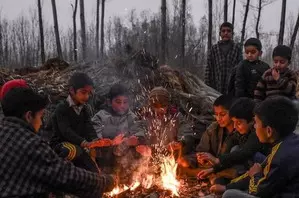Clear night sky pushes temperature further down in J&K

Srinagar, Jan 9 Due to clear night sky, minimum temperature dropped across Jammu and Kashmir as Srinagar city recorded minus 4.4 degrees Celsius on Thursday.
The Meteorological (MeT) Department officials said that due to a clear night sky, the minimum temperature dropped again on Thursday as Srinagar city recorded minus 4.4 as the minimum temperature.
The minimum temperature was minus 1 in Srinagar city on Wednesday.
Gulmarg had minus 9.6 and Pahalgam minus 10.4 as the minimum temperature on Thursday. Jammu city recorded 5.5, Katra town 6.4, Batote 3.3, Banihal 3.8 and Bhaderwah minus 0.2 as the night’s lowest temperature.
A MeT office statement said, “On January 9 to 10, generally dry weather with cloudiness during 10th evening/night. On January 11, generally cloudy with light rain (plains of Jammu) and Snow at isolated higher reaches of the Jammu Division & Kashmir Division. On January 12 to 14, generally dry. On January 15 to 16, generally cloudy with light snow at isolated to scattered places."
The department issued an advisory: “Cold wave at isolated places. Tourists/travellers/Transporters are advised to follow Admin/Traffic advisory.”
The 40-day-long period of intense winter cold, locally called the ‘Chillai Kalan’ started on December 21 and will end on January 30. All lakes, streams, springs, wells and ponds are presently frozen partially in Kashmir. Mornings are colder than the rest of the sunlight period during the day as fog and frost on streets and highways make pedestrian and vehicular movement very risky.
Doctors have cautioned people, especially children and older people, not to expose themselves to long periods of cold, which causes hypothermia. This is the main cause of constriction of blood vessels leading to myocardial infarction. People suffering from myocardial infarction are vulnerable to heart attacks and heart failures. Globally five lakh people die each year of cardiac issues during the winter months, doctors quoting international researchers said.
Source: IANS